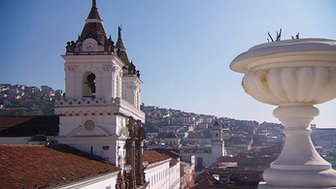Syrian president Assad says army 'has balance of power'
President Bashar al-Assad suggests Syria may have received Russian arms
The Syrian army has scored "major victories" against rebels and now holds "the balance of power" in the conflict, President Bashar al-Assad has told a Lebanese TV station.
He also suggested Syria may have received the first shipment of an advanced Russian air defence system.
Russia vowed earlier this week to go ahead with sending S-300 missiles.
Meanwhile, the main opposition outside Syria said it would not take part in peace talks while massacres continued.
Speaking in Istanbul where the Syrian National Coalition is meeting, its interim head, George Sabra, said talk of diplomatic conferences was farcical while Syrian government forces backed by the Lebanese Shia movement Hezbollah were carrying out heinous crimes.
Analysis
The delivery of S-300 missiles and their associated radars to Syria - if confirmed - is seen by experts as a potential game-changer: not just in terms of the country's air defence capabilities but also in terms of the signal it sends about Moscow's willingness to back the Syrian regime.
The S-300 is a highly capable Russian-built anti-aircraft system that is also able to shoot down in-coming ballistic missiles. In many ways it is an equivalent to the US Patriot system that Nato has deployed to Turkey to protect its airspace.
It takes some time for crews to become proficient in operating this kind of weapon and it might take further time to integrate it into Syria's wider air defence system.
But its presence would significantly complicate Israel's ability to operate in Syrian airspace and make the US and other Western air forces more cautious should there be renewed talk about establishing "no-fly" zones over Syria.
Last week, a spokesman for the National Coalition had said it would attend, but only if Mr Assad agreed to step down.
In his interview, Mr Assad said Syria would "in principle" attend the talks if there were not unacceptable preconditions.
However, he said it would not be surprising if the conference failed, and if it did, it would not make much difference on the ground, because what he called the "terrorism" of the rebels would continue.
'Major victories'President Assad's interview with Hezbollah-linked al-Manar TV was broadcast on Thursday.
He said he was "very confident" about the victory of his forces, and said Russia had fulfilled some of its weapons contracts.
However, he did not specify whether this included the S-300 missiles - a highly capable surface-to-air missile system that, as well as targeting aircraft, also has the capacity to engage ballistic missiles.
Mr Assad said there was "popular pressure" to open a military front against Israel on the Golan Heights, and said Syria would respond directly if there were any further Israeli air strikes.
Israel has warned it would regard the Russian missiles as a serious threat to its security.
Who are Hezbollah?

- Lebanese Shia Muslim group
- Name means the Party of God
- Defined by hostility to Israel since 1980s
- Fought Israel in a bitter and deadly war in 2006
- Made up of political and military wings
- Strongest member of Lebanon's pro-Syria bloc
- Consistently backs Assad rule in Syria
- Fighters known to be active inside Syria
- Branded a terrorist group by Washington
On Thursday, Israeli Energy Minister Silvan Shalom told public radio that Israel did not want to "escalate" the situation with Syria, but would not allow the transfer of strategic weapons to Hezbollah.
'Invading'Earlier, a rebel leader accused Hezbollah of "invading" Syria.
Gen Selim Idriss, the military chief of the main umbrella group of Syrian rebels, the Free Syrian Army, claimed that more than 7,000 fighters of the Lebanese Shia movement were taking part in attacks on the rebel-held town of Qusair.
He made an emotional appeal to Western powers on the BBC World Service's Newshour programme, saying: "We are dying. Please come and help us."
More than 50,000 residents were trapped in the town and a "massacre" would occur if it fell, he added.
Opposition groups and humanitarian organisations say conditions for the civilians and the wounded in Qusair are dire, with doctors saying oxygen and other medical supplies have run out.
Syrian government officials say a corridor has been established to allow civilians to escape, and fighters who put down their arms are free to leave too.
Government and Hezbollah forces are reported to have retaken from rebels a disused military airfield north of Qusair.

- The long-range surveillance radar tracks objects over a range of 300km (185 miles) and relays information to the command vehicle, which assesses potential targets.
- A target is identified and the command vehicle orders the engagement radar to launch missiles.
- Launch data is sent to the best placed of the battalion's six launch vehicles and it releases two surface-to-air missiles.
- The engagement radar helps guide the missiles towards the target. It can guide up to 12 missiles simultaneously, engaging up to six targets at once.



 Massacre 'proof'
Massacre 'proof' Assad warns Israel against strikes
Assad warns Israel against strikes Mars mistake
Mars mistake 7 days quiz
7 days quiz Pivot to Asia
Pivot to Asia Tide of bloodshed
Tide of bloodshed Life begins at...
Life begins at... Fast Track
Fast Track